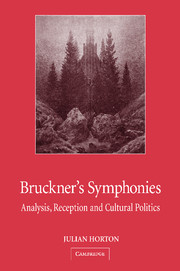Book contents
- Frontmatter
- Dedication
- Contents
- Preface
- 1 Introduction: the critical problem
- 2 Bruckner and late nineteenth-century Vienna: analysis and historical context
- 3 Right-wing cultural politics and the Nazi appropriation of Bruckner
- 4 Bruckner and musical analysis
- 5 Bruckner and the construction of musical influence
- 6 Analysis and the problem of the editions
- 7 Psychobiography and analysis
- 8 Epilogue: Bruckner and his contexts
- Bibliography
- Index
4 - Bruckner and musical analysis
Published online by Cambridge University Press: 22 September 2009
- Frontmatter
- Dedication
- Contents
- Preface
- 1 Introduction: the critical problem
- 2 Bruckner and late nineteenth-century Vienna: analysis and historical context
- 3 Right-wing cultural politics and the Nazi appropriation of Bruckner
- 4 Bruckner and musical analysis
- 5 Bruckner and the construction of musical influence
- 6 Analysis and the problem of the editions
- 7 Psychobiography and analysis
- 8 Epilogue: Bruckner and his contexts
- Bibliography
- Index
Summary
It is perhaps emblematic of Bruckner's location on the margins of musical analysis that current debate over the applicability of established theoretical models to his music should have developed at a time when their influence has waned in the face of postmodern or ‘new’ musicological critiques. Belated realisation that the symphonies are, albeit problematically, susceptible to voice-leading analysis, or that they stand in an analytically profitable relationship with the topical and formal discourses of the Beethovenian symphony, has ironically coincided with a fundamental reappraisal of the aims and methods of analysis, amidst a general redefinition of institutional priorities. It is a further irony that the admission of Bruckner to the analytical canon has, at least partly, entailed critical reappraisal of the limitations of the theories applied. Debate attending the last-minute ‘construction’ of the symphonies via the mechanisms of formal analysis runs parallel with the critical ‘reconstruction’ of analysis in response to postmodern or poststructuralist hostility.
There are two related matters under scrutiny here: the question of whether Bruckner's practices are normative or marginal in themselves; the more general problem of whether the repertoire they occupy is part of, or extraneous to, a theoretically defined common practice. Both issues are present as text or subtext in a recent exchange between Edward Laufer and Derrick Puffett concerning the applicability of Schenkerian theory. Laufer traces the marginalisation of Bruckner by Schenkerians to Schenker's famously hostile reception of Bruckner as a composer for whom ‘the art of prolongation was no longer attainable’.
- Type
- Chapter
- Information
- Bruckner's SymphoniesAnalysis, Reception and Cultural Politics, pp. 92 - 161Publisher: Cambridge University PressPrint publication year: 2004



